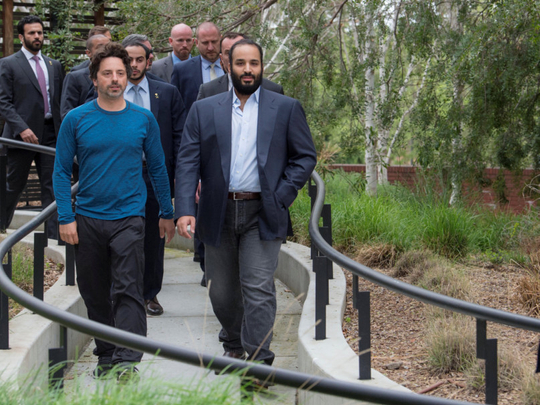
Dubai: From the moment the young Crown Prince of Saudi Arabia Mohammed Bin Salman set foot in Silicon Valley, the doors of the most powerful businessmen in America swung open for him where he rocketed into the centre of the tech sector meeting the leaders of Google, Apple, etc.
The Crown Prince captured the world’s imagination earlier when the Saudi Public Investment Fund became the single largest foreign investor in Uber, allocating $3.5 billion (Dh12.8 billion) to the ride-hailing company in 2016.
The Fund has also allocated $50 billion since 2016, into investments abroad, focused on global AI, robotics, and the mobile economy, committing another $45 billion to partner with SoftBank in its $94 billion vehicle to invest in global technology.
Sam Blatteis, CEO of regional public policy advisory and research firm The Mena Catalysts and ex-Google Head of Government Affairs and Public Policy for Gulf Countries, told Gulf News that the ground has shifted in Saudi Arabia, the largest Arab economy.
“The rise of ‘Generation Y’ leaders are making big bets on the Saudi digital economy. If Saudi Arabia is going to compete as a global high-tech player, it must attract the biggest brand names in the sector. If the government gets this right, the tech industry in the kingdom could pivot Saudi for years to come — empowering Saudi businesses, equipping Arab youth with critical ICT skills and maybe fundamentally altering the country’s economic trajectory,” he said.
He said the rise of the Saudi tech sector has untapped potential to have positive knock-on effects on the UAE technology ecosystem.
“As tech companies begin to establish a presence there, we will see not only even more online consumption but also more Arab knowledge creators. Unlike other sectors, many online advertisers in Dubai actually pay for ‘inventory’ in Saudi Arabia.
“We assess that this will grow. Because tech companies can turbo-charge the amount of indigenous content through training and accelerator programmes,” he said.
Key market
Abdul Rahman Al Thehaiban, senior vice-president for technology at Oracle Middle East and Africa, said that cloud-led digital transformation is on the rise in Saudi Arabia with the public and private sector now driving major transformative initiatives.
“Digital transformation is at the core of Saudi Arabia’s Vision 2030 programme that focuses on diversifying the country’s economy.”
He said that Saudi Arabia is a key market for Oracle and over the past two decades “we have constantly invested in expanding our infrastructure, deploying expert resources and introducing latest cloud innovations.”
“We will soon have data centre facilities in the region [UAE and Saudi Arabia], and our customers are excited about this development, particularly as they see the value of Oracle’s unique ability to deliver solutions at every layer of the cloud stack (SaaS, IaaS, DBaaS and PaaS) — they can tackle digital disruption head on,” he said.
Industry experts see Saudi Arabia as a consumer market, rather than earlier outdated images, with a young population where tech companies have a huge opportunity.
“The leadership realises that technology is the translation of science into tools. The fact that the Crown Prince just spent the longest leg of his US trip on the West Coast really shows the epicentre in the Saudi-US corporate relationship is moving from oil and defence to tech,” Blatteis said.
Initiatives
Prashant Kolleri, managing director for Saudi Arabia and Pakistan for market research and analysis services provider Kantar Insights, that Saudi Arabia has always been an important market in the Middle East in terms of size, opportunity and will continue to be so.
He said the perspectives and priorities driving social and economic initiatives are different for the two markets [UAE and Saudi Arabia] given how they have evolved in the past few decades, and this reflects in the inspiring Vision documents in place for both countries.
“Dubai/UAE and Saudi Arabia are to some extent interdependent markets, economically and socially. Dubai/UAE will benefit from the Saudi Arabia opportunities and vice versa. It is difficult to see just business opportunity as a single dimension in isolation. The competitive advantages of the two markets are unique,” he said.








